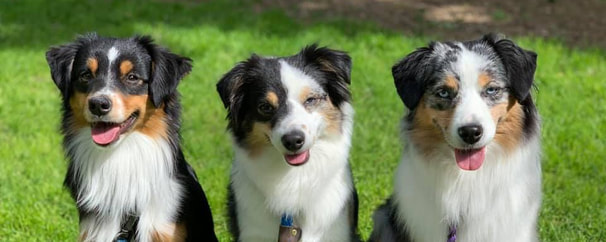How to Choose a Responsible Breeder
of Miniature American Shepherds
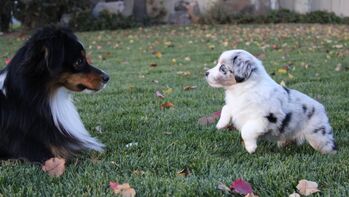
Are you considering adding a Miniature American Shepherd (Miniature Australian Shepherd) to your family? First, I recommend you research about the breed to determine if they would be a good fit for you.
Once you have done your research about Miniature American Shepherds or Miniature Australian Shepherds, it can be overwhelming to find a breeder who you feel you can trust and can match you to a suitable pup for you.
Here are some helpful tips when searching for a responsible breeder!
Once you have done your research about Miniature American Shepherds or Miniature Australian Shepherds, it can be overwhelming to find a breeder who you feel you can trust and can match you to a suitable pup for you.
Here are some helpful tips when searching for a responsible breeder!
10 Things to consider when searching for a breeder:
- Genetic Disease Testing
- OFA Testing
- Temperament
- Structure
- Titling Dogs
- Raising Pups
- Finding Homes
- Contracts
- Lifelong Support
- What are YOU Looking For?
Genetic Disease Testing:
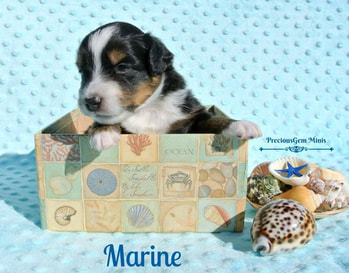
As technology has advanced, breeders and owners both benefit from the ability to test our dogs for inherited genetic diseases that have been researched. Each breed has a different set of genetic diseases that they are more prone to. If the genetic information has been discovered, we can test breeding dogs for those tests and determine if that breeding dog is clear for the disease, has one copy of the disease, or has two copies. This allows a breeder to make educated decisions when pairing a male and a female so they can avoid producing puppies that could be affected by a known genetic disease. Now, not ALL diseases have known genetic markers, but there are several we can test for and new tests are researched and developed over time.
However, for Miniature American Shepherds and Miniature Australian Shepherds, I recommend that breeders test for the following genetic diseases at a minimum:
Keep in mind there are even more tests available but these are some of the most important and prevalent diseases, in my opinion, as a breeder and veterinary technician. Some companies run testing through large panels that include these tests and more (though not all are relative to the breed) while other companies the breeder has to select and choose which tests they want included. Both are great options as long as the important breed-specific tests are completed.
These results should be shared for each dog by the breeder or listed on their website.
However, for Miniature American Shepherds and Miniature Australian Shepherds, I recommend that breeders test for the following genetic diseases at a minimum:
- MDR1
- PRA
- CEA
- HC
- CD
- HUU
- DM
- CDDY
- NAD
Keep in mind there are even more tests available but these are some of the most important and prevalent diseases, in my opinion, as a breeder and veterinary technician. Some companies run testing through large panels that include these tests and more (though not all are relative to the breed) while other companies the breeder has to select and choose which tests they want included. Both are great options as long as the important breed-specific tests are completed.
These results should be shared for each dog by the breeder or listed on their website.
OFA Testing:
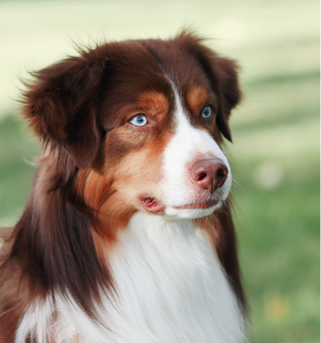
Another really important aspect of breeding is testing dogs for physical disease that could have genetic tendencies. OFA stands for Orthopedic Foundation for Animals and they gather information and keep a public record of testing done on breeding dogs. They also have recommended tests to perform based on the breed of dog.
For Miniature American Shepherds and Miniature Australian Shepherds, I recommend these OFA tests:
In addition to these tests, I also document results for the following tests because they can be done at the same time as hips, elbows, or patellas as long as there is a veterinary exam done.
Knowing the results of these tests can greatly influence decisions that a breeder makes regarding how to move forward with a dog in their program. For example, if a breeding dog is discovered to have hip dysplasia, it is NOT recommended that the dog should be bred. There can be genetic components of these issues that could be passed on to puppies but also environmental components (not genetic) to most of these physical tests as well.
These results should be available to the public via OFA.org or by asking the breeder for OFA certificates or listed on their website.
For Miniature American Shepherds and Miniature Australian Shepherds, I recommend these OFA tests:
- Hip Dysplasia (PennHip is a comparable replacement)
- Elbow Dysplasia
- Patellar Luxation
- Eye Examinations (CAER exam is recommend - sometimes distance to an ophthalmologist can be a factor)
In addition to these tests, I also document results for the following tests because they can be done at the same time as hips, elbows, or patellas as long as there is a veterinary exam done.
- Basic Cardiac
- Dentition
Knowing the results of these tests can greatly influence decisions that a breeder makes regarding how to move forward with a dog in their program. For example, if a breeding dog is discovered to have hip dysplasia, it is NOT recommended that the dog should be bred. There can be genetic components of these issues that could be passed on to puppies but also environmental components (not genetic) to most of these physical tests as well.
These results should be available to the public via OFA.org or by asking the breeder for OFA certificates or listed on their website.
Temperament:
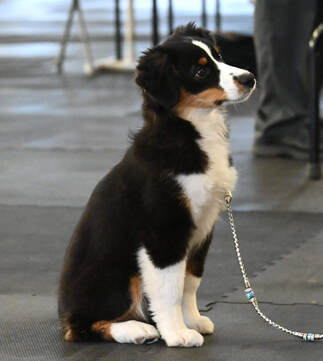
What can a breeder tell you about the temperament of their dogs? More specifically, what about the parents of a current or upcoming litter? It is important to understand that temperament is still variable across the breed as a whole and not always consistent, even in the same litter. What is considered normal or good temperament to one breeder may not be normal or good to another breeder for their program.
I have found that asking more specific questions helps get a better understanding of a dog’s personality. It may be easier for some breeders to discuss these things over the phone.
Some ideas of questions you can ask include:
To reiterate, each breeder may have a variety of temperaments or have different preferences in temperament traits than another breeder. It can be helpful to you to understand this information.
Because temperament/personalities can vary in puppies in the same litter, I find it very helpful for a breeder to be observant and heavily involved in the rearing of their puppies. If they are, they can often pick up on patterns of behaviors that can suggest possible traits as adults. Some breeders will also perform temperament testing for another opportunities to see how the puppies react to different situations. This can help them to make better decisions when matching pups to families.
I have found that asking more specific questions helps get a better understanding of a dog’s personality. It may be easier for some breeders to discuss these things over the phone.
Some ideas of questions you can ask include:
- How does the dog react to meeting new people and meeting new dogs?
- Are they confident and happy in public or are they anxious/nervous or somewhere in between?
- What is their energy level like?
- Do they have instinct to herd or chase (prey drive)?
- Are they motivated by food and/or toys?
- How biddable or motivated to work are they?
- What activities or sports do they enjoy?
- How do they do with children?
To reiterate, each breeder may have a variety of temperaments or have different preferences in temperament traits than another breeder. It can be helpful to you to understand this information.
Because temperament/personalities can vary in puppies in the same litter, I find it very helpful for a breeder to be observant and heavily involved in the rearing of their puppies. If they are, they can often pick up on patterns of behaviors that can suggest possible traits as adults. Some breeders will also perform temperament testing for another opportunities to see how the puppies react to different situations. This can help them to make better decisions when matching pups to families.
Structure:
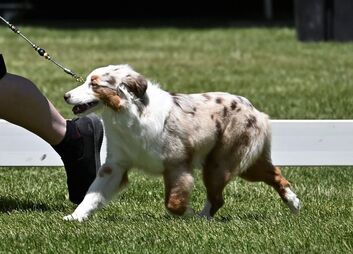
How a dog is built and how they move can influence their life in a positive or negative way. A reputable breeder should be taking into account the structure of their dogs and their movement. Do they pair complimentary dogs together in hopes to improve each generation? It is hard for an untrained eye to see and understand structure. Be aware, not every breeder will know what to look for unless they have had a mentor and/or done their own research.
If a breeder is competing in dog shows (aka conformation), this is a good indicator that they are interested in structure and movement and understand their importance for a dog’s longevity. Dog shows weigh heavily on structure, movement, temperament, head, coat, coloring, substance, and many other aspects in regard to overall quality of the dog. Conformation is intended to be an unbiased opinion from outside experts that a breeder’s dogs are of good quality and worthy of being bred. Not every breeding dog will be shown, but that is the intention of showing a dog in conformation.
As a pet buyer with less knowledge of canine structure, you may want to ask:
How do you hope this particular pairing of the male and female will compliment each other?
If a breeder is competing in dog shows (aka conformation), this is a good indicator that they are interested in structure and movement and understand their importance for a dog’s longevity. Dog shows weigh heavily on structure, movement, temperament, head, coat, coloring, substance, and many other aspects in regard to overall quality of the dog. Conformation is intended to be an unbiased opinion from outside experts that a breeder’s dogs are of good quality and worthy of being bred. Not every breeding dog will be shown, but that is the intention of showing a dog in conformation.
As a pet buyer with less knowledge of canine structure, you may want to ask:
How do you hope this particular pairing of the male and female will compliment each other?
Titling Dogs:
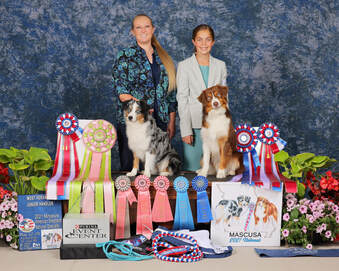
I would like to recommend to you to consider what a breeder does with THEIR dogs? Are they taken to activities, events, competitions, or trained for certain tasks? It is nice to be able to see what a breeder’s dogs have been able to accomplish and what that breeder has a focus for.
For example, a lot or reputable breeders compete in conformation (dog shows) as I discussed in the section above. There is a LOT that is involved with conformation and how a dog is viewed. Competing in conformation allows a dog the opportunity to earn a championship (or higher) if they are of good quality against the competition and attend enough shows. To re-iterate, conformation judges compare the dog to our written breed standard for the Miniature American Shepherd. The breed standard describes the ideal dog. It includes details such as structure, movement, temperament, head type, body, coloring, coat, and more.
Or, is this breeder training or competing in sports? There are many activities that a Miniature American Shepherd or Miniature Australian Shepherd could enjoy, depending on the individual dog and their interests.
Some examples include: Rally, obedience, agility, scent work, dock diving, barn hunt, frisbee, flyball, tricks, and more.
Titles are the letters that come before and after a dog's registered name. It is important to understand that titles do NOT define a dog. There are amazing dogs that contribute great qualities to our breed and are NOT titled.... BUT a breeder who strives to do things with their dogs and prove their abilities/quality impresses me more than a breeder who doesn’t try at all.
For example, a lot or reputable breeders compete in conformation (dog shows) as I discussed in the section above. There is a LOT that is involved with conformation and how a dog is viewed. Competing in conformation allows a dog the opportunity to earn a championship (or higher) if they are of good quality against the competition and attend enough shows. To re-iterate, conformation judges compare the dog to our written breed standard for the Miniature American Shepherd. The breed standard describes the ideal dog. It includes details such as structure, movement, temperament, head type, body, coloring, coat, and more.
Or, is this breeder training or competing in sports? There are many activities that a Miniature American Shepherd or Miniature Australian Shepherd could enjoy, depending on the individual dog and their interests.
Some examples include: Rally, obedience, agility, scent work, dock diving, barn hunt, frisbee, flyball, tricks, and more.
Titles are the letters that come before and after a dog's registered name. It is important to understand that titles do NOT define a dog. There are amazing dogs that contribute great qualities to our breed and are NOT titled.... BUT a breeder who strives to do things with their dogs and prove their abilities/quality impresses me more than a breeder who doesn’t try at all.
Raising Puppies:
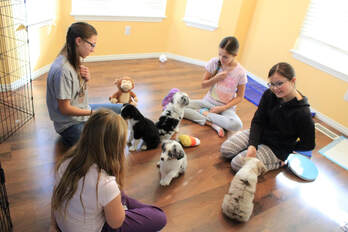
How the puppies are raised is very important to start them off on the right paw! Here are some basic questions you can consider. What are the puppies living conditions like? Are they raised inside or outside or both? How much interaction with people do they get? Have the puppies been raised with Early Neurological Stimulation (ENS)? Have the puppies been exposed to many different sounds, textures, and objects? How did the puppies react to the new objects? Have they safely been exposed to other people and pets? Have they began any basic training such as using a litterbox or learning to have manners? Are they introduced to crates, or collars, or walking on a leash? These are helpful questions when trying to understand how involved a breeder is in rearing their pups.
There are also a handful of programs available to breeders that help guide them in rearing pups to the best of their ability. Some of these programs include:
Puppy Culture, Avidog, Badass Breeder, Breeders Bootcamp, etc. These are great tools for breeders to give their puppies the best experiences before leaving to knew homes.
There are also a handful of programs available to breeders that help guide them in rearing pups to the best of their ability. Some of these programs include:
Puppy Culture, Avidog, Badass Breeder, Breeders Bootcamp, etc. These are great tools for breeders to give their puppies the best experiences before leaving to knew homes.
Finding Homes:
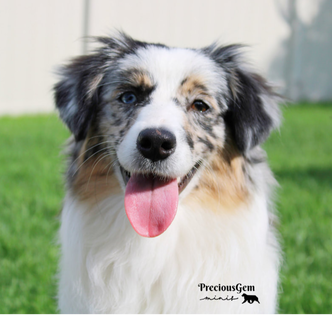
A great breeder puts in so much time, energy, and love into raising their puppies. They should want to find great homes that are suited for their breed. Does the breeder have a screening process in place that allows them to get to know potential families before taking home a puppy? This is often in the form of an application and/or phone call. What kind of questions do they ask? Are they concerned about families being responsible pet owners? Are they wondering what your expectations are and what qualities you are looking for in a dog? This will help the breeder determine if their pups are a good fit for the person or family.
It is also helpful for a breeder to be involved in matching potential personalities to the homes that are interested. This is best done when the pups are 6-8 weeks and showing a little bit of who they are. To me, this is more important than gender and color combinations. When you select a puppy at 3 days old, that information is not available to you!
It is also important to note that most breeders who are serious about improving their programs will wait until 8 weeks to perform evaluations on pups before deciding which pups will stay in their program or have the potential to be show/breed pups and which will be available to companion or sport homes. If you are looking for a show/breeding dog, make sure you are not selecting before 7 weeks of age before the ideal time to evaluate.
It is also helpful for a breeder to be involved in matching potential personalities to the homes that are interested. This is best done when the pups are 6-8 weeks and showing a little bit of who they are. To me, this is more important than gender and color combinations. When you select a puppy at 3 days old, that information is not available to you!
It is also important to note that most breeders who are serious about improving their programs will wait until 8 weeks to perform evaluations on pups before deciding which pups will stay in their program or have the potential to be show/breed pups and which will be available to companion or sport homes. If you are looking for a show/breeding dog, make sure you are not selecting before 7 weeks of age before the ideal time to evaluate.
Contracts:
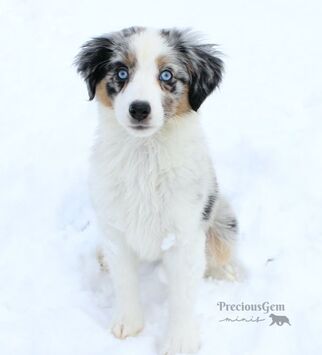
A reputable breeder requires puppies to be sold on a contract. This should be in place to protect the breeder, the buyer, but most importantly the puppy. A good breeder will have a health guarantee listed in the contract. They will often specify that the puppy is for showing/breeding or is sold as a pet/companion. If the puppy is sold as a pet/companion, it is very common for the contract to require the puppy to be spayed or neutered when they are older. This contract is also important to make sure that if anything happened in the future, the puppy must NOT be surrendered to a shelter, rescue or resold. The breeder will either take the puppy back or help in rehoming.
Lifelong Support:
A reputable breeder is always there for you for the lifetime of your puppy. They may be able to help answer questions or offer advice or support. This can be a very valuable resource for you, especially through puppy-hood and end of life care. We also love updates of our pups to see how they are doing and are well loved! I LOVE seeing pictures and updates of my pups!
What are YOU looking for in a Miniature American Shepherd?
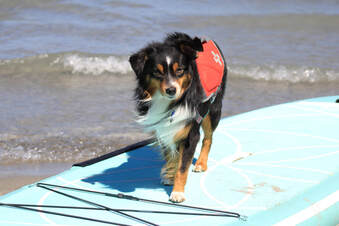
Lastly, a successful search for a good breeder for you lies in what qualities YOU are looking for. This can help differentiate between several breeders who have made it to your “short list” thus far. Are you looking to compete in any sports? If so, what sports? Are you picky about temperament? Would you like a dog with good structure? A dog that will look like a small Aussie in looks? What qualities are most important to you? What lifestyle will your dog have with you?
** Important Note: Please keep in mind that coat color, eye color, and gender are often the first things we think of when searching for a Miniature American Shepherd puppy. It is the most obvious difference when looking at cute pictures and our first impression of the dog. HOWEVER, I believe that these should be the LEAST important aspects when looking for a Miniature American Shepherd. Temperament and traits suitable to the lifestyle that you hope to have is most important!!
** Important Note: Please keep in mind that coat color, eye color, and gender are often the first things we think of when searching for a Miniature American Shepherd puppy. It is the most obvious difference when looking at cute pictures and our first impression of the dog. HOWEVER, I believe that these should be the LEAST important aspects when looking for a Miniature American Shepherd. Temperament and traits suitable to the lifestyle that you hope to have is most important!!
